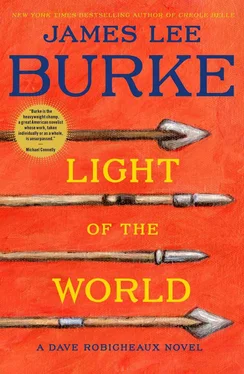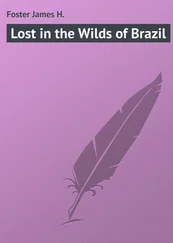We left Clete with Felicity Louviere and walked three abreast across the lawn, Alafair and Gretchen and I, each of us bearing down on Caspian Younger, who had just emerged with his men from the cherry orchard.
Like most cowards, he had not anticipated our response. He could have opened fire on us or ordered his men to do so, but he knew they were all watching him, expecting him to be more than the posturing figure who wore the quilted vest of the hunter and used the martial rhetoric of a drill instructor. He stood awkwardly in front of his men, the breeze tousling his hair. A blue-black revolver with white handles hung from his right hand. It was probably a collectible, the kind a publicity-oriented army officer with political aspirations might wear in a shoulder holster.
“Well, what do we have here?” he said.
“Keep working on it. You’ll figure it out,” I replied.
“Is this the defining moment for you and your little team, Mr. Robicheaux?”
“You tell me, Mr. Younger. You’re the guy who turned his wife over to the tender mercies of a sadist like Asa Surrette, the same man who murdered your daughter,” I said.
“Like always, you’ve got it wrong,” he said.
“He suffocated her with a plastic bag and ejaculated on her legs,” I said. “She was seventeen. Maybe she called out your name when she begged for help.”
His whiskers looked like dirty smudges on his cheeks and chin. His eyes shifted sideways when he saw that he was caught between allowing me to speak and ordering his men to shoot in order to stop me from revealing his failure as a father and husband and finally as a human being. I held the M-1 at port arms, the safety off; no matter how things played out, I was determined to spike his cannon before I went down.
“I get it,” he said. “This is your finest hour. The egalitarian philosopher delivering his grand speech to the multitudes. Unfortunately, the role doesn’t serve you well. We’ve researched every aspect of your life, Mr. Robicheaux. We have your psychiatric records, your pitiful statements about your dependency on your whore of a mother, your sexual history in Manila and Yokohama, the possibility of a homoerotic relationship with your fat friend, your constant whining about all the injustices visited on the miserable piece of swamp you grew up in. The fact that you take others to task for their mistakes has established new standards in hypocrisy.”
“The problem for you, Mr. Younger, is that after I’m dead and gone, you’ll still be you,” I said. “You’ll wake up every morning knowing that your half brother is Wyatt Dixon, and on his worst day, he could stuff you in a matchbox with his thumb. By the way, how’d a loser like you convince all these guys to work for you? Do they know you had your daughter killed so you could inherit her estate? If you’d do that to her, what will you do to them?”
“You’re looking at your executioner, Mr. Robicheaux,” he said. “Want to add anything to your final words?”
“Yeah, you’re going with me,” I said.
“No matter what happens, I’m instructing my men to enjoy themselves with Horowitz and your daughter one piece at a time. They’re going to be busy girls. Let that be your last thought, Mr. Robicheaux. I think we should get the festivities started now, so you can watch what you’ve wrought. I understand Horowitz has already pulled a train or two, so she might enjoy it.”
“Fuck you, you little pimp,” Alafair said.
“Copy that,” Gretchen said.
The three of us knew our time had run out, and our flippancy was a denial of the fate that awaited us. We’d rolled the dice and lost. So this is where it all ends, I thought. All our dreams and hopes become as naught, and evil men are allowed to hang their lanterns on our tombstones. What greater folly is there?
I swallowed and looked at the ground, then raised my head. I knew if I swung the muzzle of the M-1 in front of me and began squeezing off rounds, I might put a couple of serious holes in Caspian Younger. Chances were I would not. Too many weapons were pointed at me. I suspected I had about three or four seconds to live.
I saw an electrical flash in the clouds. It seemed to leap into the sky from a snowfield cupped between two mountains and ripple through the heavens all the way to the horizon. In that brief moment, I saw a figure standing atop the peaked roof of the work shed, like a human lightning rod waiting to be struck. I was too far away to make out his features, but I was sure I saw his starched-brim cowboy hat and wide shoulders and tapered hips and thighs stuffed into tight-fitting Wranglers.
I saw the rifle, too. It was a long-barrel lever-action repeater, and I guessed it was the 1892 Winchester with an elevator sight that Wyatt Dixon carried in the camper shell on the back of his truck.
The shooter fired only once. The round was likely soft-nosed, with a notched cross hammer-tapped into the lead for good measure. When it struck the back of Caspian Younger’s skull, it left a hole no bigger than the tip of your little finger but blew his forehead apart like an exploding watermelon. He fell forward into a spruce tree, stone dead, his throat catching in a fork, his knees striking the ground simultaneously.
The lightning died in the sky, and the roof of the shed receded into a blue-black darkness that seemed to be spreading from the lake across the entirety of the valley. The men who had been standing on either side of Caspian Younger moved away from his body, staring at it dumbly, glancing back at the orchard and the shed and the mountaintops, as jagged and sharp as scissored tin against the sky.
I tried to make out their faces. Were they mercenaries, adventurers, or jailhouse riffraff? They seemed to have no more depth or singularity than a computer-generated illusion. “We’ve got no grievance against you guys,” I said. “The way I see it, Younger got what he deserved. How about we call it square?”
No one moved or spoke.
“There’s another way to look at it,” I said. “That was probably Wyatt Dixon on the roof. If you’ve been around these parts, you know his reputation. Who needs grief with a dude like that? Wyatt gives insanity a bad name.”
I saw them start stepping back from us, like people withdrawing from a presence they truly fear, not because of their experience with it but because of an atavistic instinct that goes back before recorded time.
Then I realized my terrible mistake.
Surrette never left the house, I thought.
Clete was still sitting on the bumper of the truck, nauseated, his head spinning from blood loss. He was looking at his feet and the shine of his blood on the tops of his loafers, his eyes half-lidded.
“Got you, fat boy,” a voice said.
Clete raised his eyes and looked straight ahead. He felt the muzzle of a handgun touch his ear. “Is that you, Boyd?” he asked.
“Surprised?”
“What happened to the light?” Clete asked.
“What light?”
“The northern lights or whatever it was. That’s you, huh, Jack? You’re still hanging around?”
“We never left, you idiot. We snookered you good.” He pushed the gun tighter into Clete’s ear. With the other hand, he picked up the Mauser bolt-action and hung it over his shoulder. “I’d say you’re in a lot of trouble.”
“Yep, that’s true,” Clete said.
“What do you think dying is gonna be like?”
“I’ll let you know.”
“You should have been a clown on one of those kid shows. You could be Captain Animal, an old pervert loitering around the kiddie park.”
“It’s a thought,” Clete said.
“You think I won’t pop you?”
“Not unless Surrette tells you to. You’re like me: You’ll always be a dirty cop, wherever you go. I’ve got a PI badge. You’ve got Surrette. For the rest of your life, you won’t take a dump without his permission.”
Читать дальше












